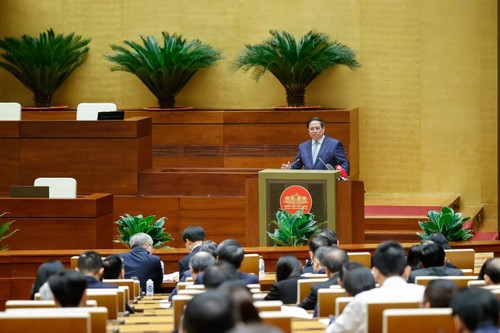 Prime Minister Pham Minh Chinh addresses the national conference of December 1. (Photo: VGP/Nhat Bac) Prime Minister Pham Minh Chinh addresses the national conference of December 1. (Photo: VGP/Nhat Bac) |
At the December 1 national conference, Prime Minister Pham Minh Chinh emphasized the importance of mobilizing more resources to drive national development.
Prioritizing and renewing growth drivers
At its recent meeting the National Assembly approved an economic growth target of at least 6.5-7% for 2025 while hoping for a more ambitious 7-7.5%. But the government sets even more ambitious goal of 8% growth to pave the way for double-digit growth in the 2026–2030 period.
The Government has set economic benchmarks for next year: GDP per capita of 4,900 USD, a Consumer Price Index of 4.5%, a budget deficit of 3.8% of GDP, and public debt of 35-38% of GDP.
The Government’s ambitious infrastructure goals include completing at least 3,000 kilometers of expressways, completing Long Thanh International Airport, and eradicating temporary or dilapidated housing nationwide. According to Prime Minister Chinh, these initiatives will lay the groundwork for Vietnam to "enter a new era, rising as a wealthy and prosperous nation."
Vietnam's overarching strategy focuses on fostering growth while maintaining macroeconomic stability, controlling inflation, ensuring key economic balances, and achieving strong surpluses.
To realize this vision, the Government is determined to revitalize traditional growth drivers—investment, consumption, and export—through targeted and innovative measures.
The Government plans to expedite the disbursement of public investment capital, focusing on national key projects, starting early next year, while increased state revenue will be spent on essential initiatives like the eastern North-South Expressway. The Government stressed the need for an effective mechanism to attract foreign investment, particularly in high-tech sectors and emerging industries like semiconductor manufacturing, artificial intelligence, and energy conversion.
To boost domestic consumption, the Government will stimulate spending, promote the “Vietnamese people prioritize Vietnamese goods” campaign, expand e-commerce, stabilize the supply and prices of essential goods, and ensure food security.
Export and trade activities will leverage the benefits of 17 free trade agreements while exploring new markets such as the Halal economy and Africa. The Government also aims to foster new growth drivers, including the digital economy, the green economy, and the sharing economy.
The primary monetary policy goal is to further reduce loan interest rates. Credit growth is projected to exceed 15%, with capital flows directed toward priority sectors, production, and business. Budget revenue in 2025 is expected to rise 10%, with stringent measures to optimize regular expenditures.
The Government aims to accelerate the development of financial and capital markets to mobilize resources for economic growth, with a particular focus on upgrading the stock market to meet international standards.
Focusing on state management, building strategies, plans
To achieve its ambitious growth targets, the Government is assessing policy impacts, institutionalizing the Party's guidelines, and translating them into actionable legislation.
Speaking at the Government’s thematic session on lawmaking on Wednesday, Prime Minister Chinh emphasized the need for a paradigm shift in law building, advocating for a balanced approach that will ensure that laws are both enforceable and flexible enough to unlock resources and foster economic growth. This approach is critical as the nation strives to achieve double-digit growth and meet its two centennial goals.
The Prime Minister highlighted the role of institutions as the "breakthrough of breakthroughs" and "the driving force and resource for development." He urged ministers and sector leaders to invest more time, effort, and resources into institutional reforms and to address outdated, ineffective, or impractical regulations to refine the legal system.
Next year will be a pivotal year in Vietnam’s socio-economic development and a cornerstone for national development goals in the 2020-2025 period.
The Party, National Assembly, and Government have identified 2025 as a year of bold action and innovation, embodying a spirit of dynamism and decisiveness to meet the nation’s socio-economic goals.